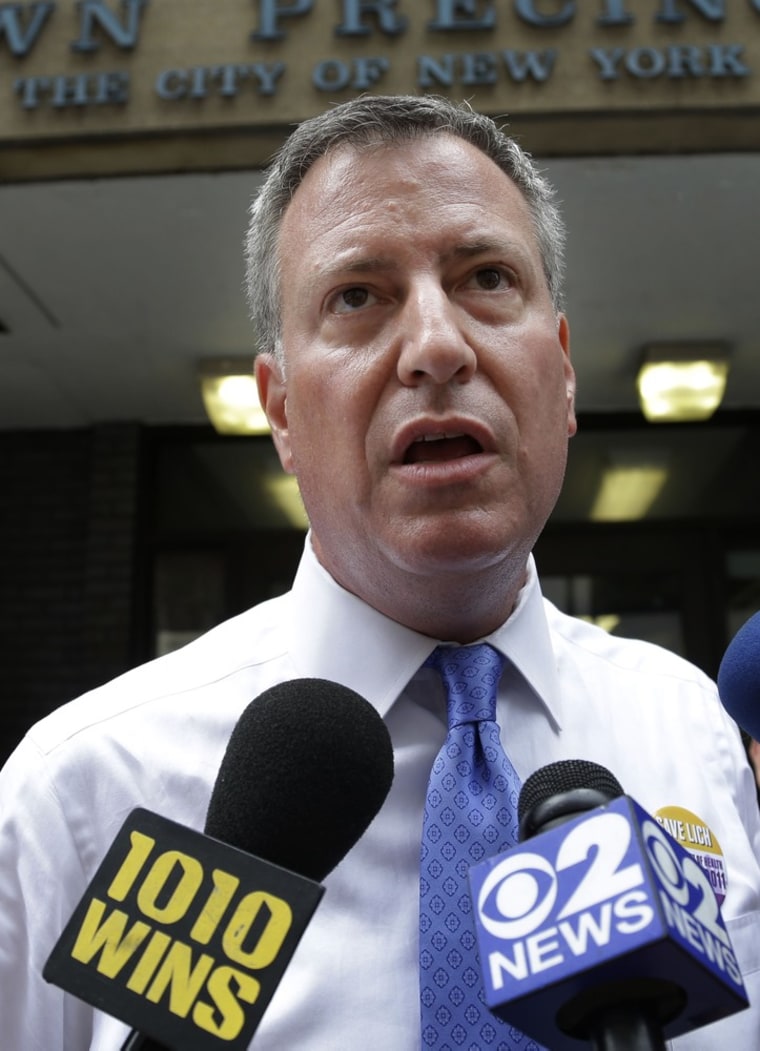New York City Public Advocate and mayoral candidate Bill de Blasio has been tweeting about food a lot lately.
Some of his most recent meals? A $7 turkey sandwich, a $5 hot dog and a slice of pizza he bought in the hopes of saving money for dinner.
All of this is because de Blasio, along with seven other elected officials in the Big Apple, is living on minimum wage for one week as part of the “Workers Rising” challenge organized by UnitedNY and New York Community for Change. Each one has $92 to spend for the entire week, and a chronicle of their struggles shared on Twitter under the hashtag #canyousurvive reveals all are having a difficult time adjusting.
De Blasio plus the others, who are all city council members, are far from the first politicians to spend a period of time living below their means. From the federal government on down, elected officials have drawn attention to poverty by spending temporary amounts of time on restricted budgets.
Though the actions have rarely resulted in tangible legislative victories, supporters of such causes say that’s not the point.
Jonathan Westin, executive director of New York Community for Change, said that each of these trials helps build public awareness about the plight of the working poor.
“We have no illusions this is going to change the minimum wage overnight,” he said.
De Blasio, who has been endorsed by Westin's group, said it’s about shedding light on something that too rarely gets it – poverty.
“If we as leaders want to represent the people of our city, than we must do what we can to understand the hardships people face, and the urgency in finding ways to lift more New Yorkers out of poverty and into the middle class,” De Blasio, who makes $165,000 yearly as the public advocate, said in an email to reporters.
In June, more than two dozen Democratic members of Congress ate on a budget of $4.50 per day as lawmakers debated controversial cuts to the Supplemental Nutrition Assistance Program, also known as food stamps.
One month after some House members went on the so-called SNAP Challenge, their Republican colleagues passed a bill that stripped billions from funding for food stamps.
Last winter, Newark, N.J., mayor and now U.S. Senate candidate Cory Booker also spent a week living on food stamps.
When Booker’s food stamp experiment ended, the New Jersey Star Ledger bluntly wrote, “Mayor Cory Booker’s week living in the life of a food stamp recipient is over and with it much of the national conversation surrounding the issue.”
The next month, New Jersey Gov. Chris Christie vetoed a bill that would have increased the state's minimum wage, though the issue will be put to a referendum vote this fall.
Projects like "Workers Rising" do have drawbacks, according to some experts.
Michael Strain, an economist with the conservative American Enterprise Institute think tank, said that older, recognizable politicians posing as low-wage earners can mislead the public in the highly charged political debate over subsidies to the poor.
“Someone like Mayor Booker, who in his 40s and has been working for years, that’s not the typical person working for minimum wage. It might distort people’s views,” he said.
According to the Bureau of Labor Statistics, nearly half of all workers who make minimum wage were under age 25 in 2012. That means a healthy portion of those earning minimum wage belong to families where they are not primary earners – a different scenario than a middle-aged person trying to make it on their own in New York or other cities.
Conservative economists argue that raising the minimum wage will put the burden on business owners and will result in them not being able to hire as many workers.
Yet, Strain said that neither political party has given enough attention to the 3.6 million Americans earning the federally regulated $7.25 per hour, and added that while politicians tweeting out pictures of themselves humbly making peanut butter sandwiches may not be the most genuine thing, it does shed light on an important subject.
David Cooper, an economic analyst with the liberal-leaning Economic Policy Institute in Washington, D.C., agreed. “When politicians do things like this -- granted I don’t think you can know what it’s really like living for just a week or a month like this – they highlight the problem, and that’s important,” he said.
For advocates like Westin, the public declarations, though not always resulting in immediate legislative action, are a welcome help.
“Living in America’s most expensive city, New York, people can’t afford rent and food and laundry,” said Westin. “This is about highlighting the difficult decisions, like am I going to eat lunch today?”
